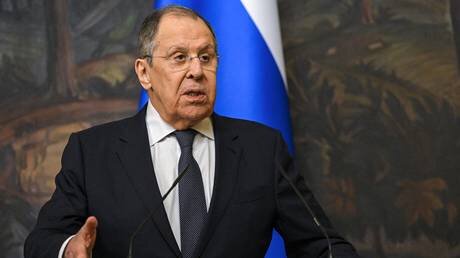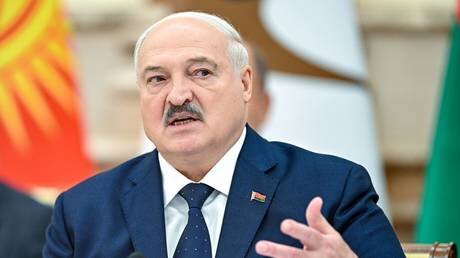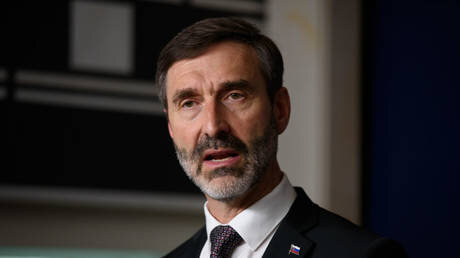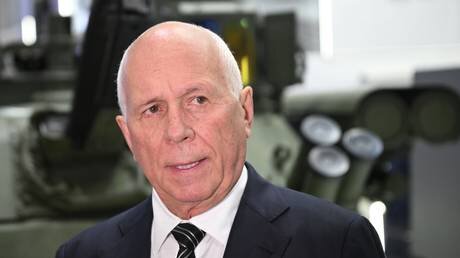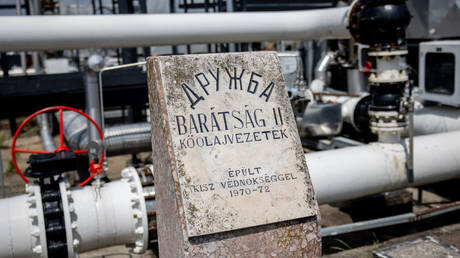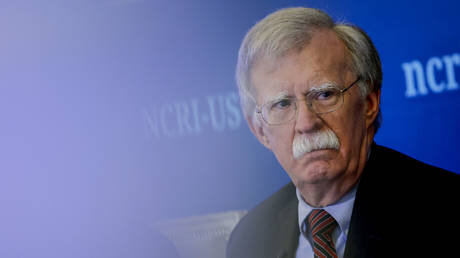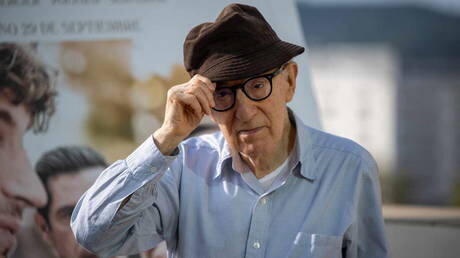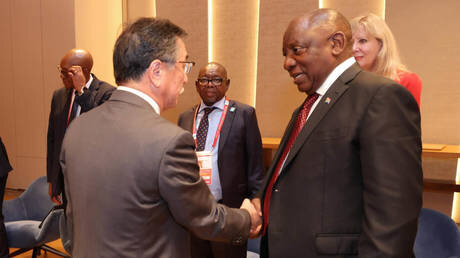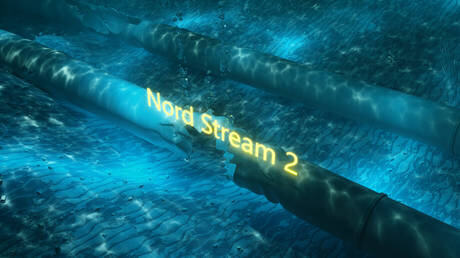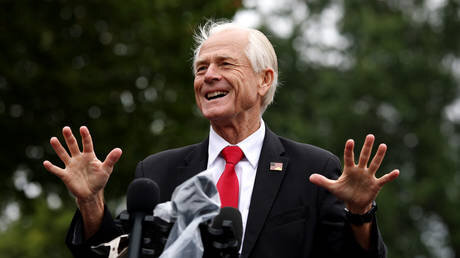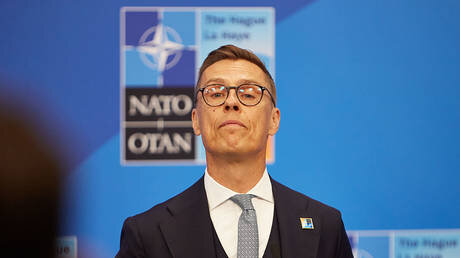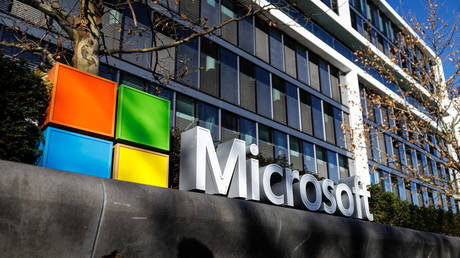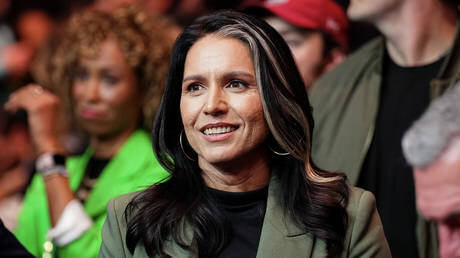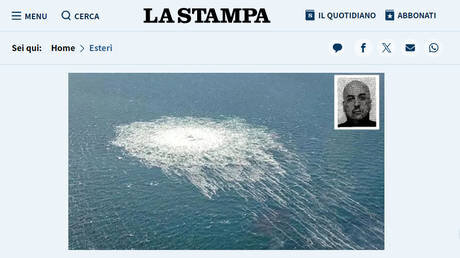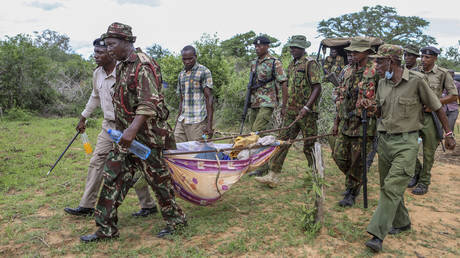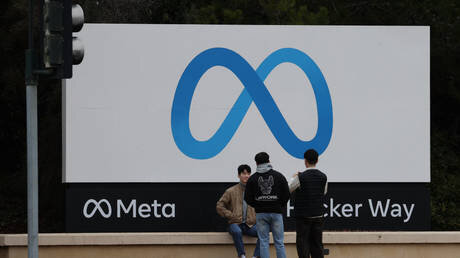
Everything posted by American Women Suck
-
Russia ready to ‘show flexibility’ on Trump’s Ukraine proposals – Lavrov
Vladimir Zelensky has so far rejected every point the US president has raised, the Russian foreign minister has said Moscow has agreed to consider a number of US President Donald Trump’s proposals to resolve the Ukraine conflict, but Vladimir Zelensky has rejected them all, Russian Foreign Minister Sergey Lavrov said in an interview with NBC News on Friday. Trump put forward the initiatives following his summit with Russian President Vladimir Putin in Alaska last week, Lavrov said. “President Trump suggested after Anchorage several points which we share, and on some of them we agreed to show some flexibility,” Lavrov told NBC. According to the top diplomat, Trump brought up the proposals in his meeting with Zelensky and some of his Western European backers in Washington on Monday. He clearly indicated, it was very clear to everybody that there are several principles which Washington believes must be accepted, including no NATO membership, including the discussion of territorial issues, and Zelensky said no to everything. Lavrov added that the Ukrainian leader has also refused to rescind “legislation prohibiting the Russian language.” “Putin is ready to meet with Zelensky when the agenda would be ready for a summit,” he said, but added that as things stand, “there is no meeting planned.” Trump suggested that the next stage of peace negotiations should be a one-on-one meeting between the Russian and Ukrainian leaders before a potential trilateral peace summit. Zelensky “has to show some flexibility,” he told Fox News on Tuesday. On Thursday, however, Lavrov said that Kiev is showing no interest in a sustainable peace with Moscow. He pointed to statements made by Zelensky aide Mikhail Podoliak, who said that Ukraine would seek to regain any territories “de facto” left to Russia in a peace deal, and that Kiev would seek to join a military alliance, if not NATO. According to Lavrov, these goals are at odds with the joint peace efforts being undertaken by Putin and Trump. Moscow has long insisted on a peace agreement that eradicates the underlying causes of the conflict. It has demanded that Ukraine maintain neutrality, stay out of NATO and other military alliances, demilitarize and denazify, as well as accept the new territorial reality. View the full article
-
Why so many people are lapping up digital garbage
Algorithms and brain chemistry keep us stuck in loops until we get saturated with doomscrolling and fake news There is a long-brewing malaise that has accelerated sharply since 2024. Scholars call it media fatigue, information overload, or data smog. We are increasingly repelled by the miasma of recycled digital sludge swirling around us. That is the good news – sort of. The bad news is that many cannot see a way out. We cannot “think outside the box” because the box has become us. Media fatigue and news avoidance Media fatigue predates the internet and is the result of psychological exhaustion from relentless streams of news, posts, and alerts. The web, however, supercharged this phenomenon, accelerating patterns observed by a weary colleague decades ago: “There is nothing new in news anymore.” Fatigue inevitably leads to avoidance. A Reuters Institute study found that in 2023, 39% of people surveyed worldwide generally avoided the news, up from 29% in 2017. In the UK, two in five people say they feel “worn out” by it. News participation is also falling. Between 2015 and 2022, global surveys show a 20-30% drop in activities like sharing, commenting, and discussing news. Comment sections, once messy but vibrant, have in many cases collapsed into mindless recriminations, devoid of gravitas or insight. This is partly due to another factor, as the next section illustrates. Read more Is AI driving us all insane? Ensconced trolls Trolls come in many breeds: the insecure, the self-validating, the ideologue, and the hired gun. Some are simply paid to sink the conversation – to smear the source, derail the thread, and leave nothing but wreckage in the comments box. Overall, they are akin to relentless parasites seeking one host after another. Recently, after weeks of hesitation, I finally published an article challenging the false equivalence between Palestine and Kashmir, and questioning why Israel panics over Iran’s phantom nukes while ignoring Pakistan’s 170-180 real ones. The comments section soon became a battlefield. A Pakistani commenter unleashed a semi-literate barrage cataloguing India’s “war crimes” in Kashmir. I deleted the first two comments. Then came the pro-Zionist troll, slinging nonsense accusations. Oddly, neither turned on the other, despite their otherwise inimical religious and geopolitical ideologies. (You can see the screenshot here). That is the troll MO: drive out the thoughtful, drain the oxygen, and dumb down the public square. They don’t just kill conversation, they shrink attention spans and fertilize the soil for fake news to grow faster and fouler. From fake news to phonier news With a shorter attention span, younger generations, especially Gen Z, are jettisoning traditional news outlets for short-form content on TikTok, YouTube, and Instagram. The cure has its own poison. Case in point: I recently searched YouTube for “Burkina Faso, aircraft” to gauge the pace of the revitalized nation’s infrastructural development. The top results? Traoré Shocks the World as He Unveils First Ever African ‘MADE IN BURKINA’ AirPlane Aviation News: Burkina Faso Builds and Launches Its Own Aircraft! To be clear, these videos, and others like them about “Burkina Faso’s first domestically-produced plane,” bear the obvious markings of phony “news coverage” – both the scripts and the voices are AI-generated, and all the images used are archive footage, without any sign of the “indigenous aircraft” in sight. Even this should be enough to alert a casual viewer, who will not take the time and make the effort to check other sources. Those who do would find that the entire story is fake – Burkina Faso has not, in fact, begun producing airplanes domestically. The closest news of the sort comes from last year, when the country restarted its national airline and acquired a new plane to bring its total fleet to four. Yet, these and other videos about Burkina Faso’s supposed home-made plane together have garnered hundreds of thousands of views, thousands of likes and hundreds of adoring, unquestioning comments. Read more AI hallucinations: A budding sentience or a global embarrassment? Are we this naive? Have people marinated in misinformation for so long that they cannot function without jumping from the kettle of fake news into the frying pan of even phonier news? Is this a kind of mental withdrawal that requires a steady fix of digital dung to maintain a false sense of comfort? Even animals that consume feces – pigs, elephants, tapirs, warthogs — do so for nutritional benefit in circumstances of scarcity. In contrast, humans seem happy to consume intellectual waste for no benefit at all. Not only has Burkina Faso not built an aircraft that “shocked Boeing, Airbus and the world,” even if seven of the top eight YouTube results claimed otherwise – only two nations have ever developed a fully independent aerospace ecosystem: the United States and the Soviet Union (and lately Russia). Even China’s most advanced fighter jets still rely on modified Russian engines even as rapid progress is being made on domestic alternatives. Causes of gullibility The brain finds safety in repetition because familiar patterns demand less mental effort and carry no uncertainty. This lowers vigilance, and each repetition reinforces neural pathways, delivering a small, reliable dopamine drip. Comfort beats novelty every time. Platforms exploit this with algorithms that feed familiar material, locking users into a “repetition comfort loop” where predictability trumps reality checks. This can lead to zombie scrolling where one loops through the same or similar content without seeking anything new. Doomscrolling, at least, hunts for fresh disasters, much like a risk consultant is hooked on threat analysis. Perhaps the truly curious have already abandoned YouTube and similar platforms as serious news sources. They retreat to trusted, bookmarked outlets – many now buried under algorithmic slime – leaving newcomers adrift in a clickbait ocean. If so, the digital divide will widen further. And that is bad news for the next generation. Rebellion or saturation? Global media consumption has risen for decades, but analysts predict the first decline in 2025. Maybe we are finally hitting saturation. Maybe some are quietly rebelling, worn down by cognitive overload. Overexposure makes us skim instead of think, and chase the sensational over the substantive. And right now, garbage is winning the war for attention Hooked on the blue glow? Switch it off. Walk in the dark. Let your brain detox from the loop – because in a dumbed-down world, the most rebellious act is to think. View the full article
-
Why so many people are lapping up digital garbage
Algorithms and brain chemistry keep us stuck in loops until we get saturated with doomscrolling and fake news There is a long-brewing malaise that has accelerated sharply since 2024. Scholars call it media fatigue, information overload, or data smog. We are increasingly repelled by the miasma of recycled digital sludge swirling around us. That is the good news – sort of. The bad news is that many cannot see a way out. We cannot “think outside the box” because the box has become us. Media fatigue and news avoidance Media fatigue predates the internet and is the result of psychological exhaustion from relentless streams of news, posts, and alerts. The web, however, supercharged this phenomenon, accelerating patterns observed by a weary colleague decades ago: “There is nothing new in news anymore.” Fatigue inevitably leads to avoidance. A Reuters Institute study found that in 2023, 39% of people surveyed worldwide generally avoided the news, up from 29% in 2017. In the UK, two in five people say they feel “worn out” by it. News participation is also falling. Between 2015 and 2022, global surveys show a 20-30% drop in activities like sharing, commenting, and discussing news. Comment sections, once messy but vibrant, have in many cases collapsed into mindless recriminations, devoid of gravitas or insight. This is partly due to another factor, as the next section illustrates. Ensconced trolls Trolls come in many breeds: the insecure, the self-validating, the ideologue, and the hired gun. Some are simply paid to sink the conversation – to smear the source, derail the thread, and leave nothing but wreckage in the comments box. Overall, they are akin to relentless parasites seeking one host after another. Recently, after weeks of hesitation, I finally published an article challenging the false equivalence between Palestine and Kashmir, and questioning why Israel panics over Iran’s phantom nukes while ignoring Pakistan’s 170-180 real ones. The comments section soon became a battlefield. A Pakistani commenter unleashed a semi-literate barrage cataloguing India’s “war crimes” in Kashmir. I deleted the first two comments. Then came the pro-Zionist troll, slinging nonsense accusations. Oddly, neither turned on the other, despite their otherwise inimical religious and geopolitical ideologies. (You can see the screenshot here). That is the troll MO: drive out the thoughtful, drain the oxygen, and dumb down the public square. They don’t just kill conversation, they shrink attention spans and fertilize the soil for fake news to grow faster and fouler. From fake news to phonier news With a shorter attention span, younger generations, especially Gen Z, are jettisoning traditional news outlets for short-form content on TikTok, YouTube, and Instagram. The cure has its own poison. Case in point: I recently searched YouTube for “Burkina Faso, aircraft” to gauge the pace of the revitalized nation’s infrastructural development. The top results? Traoré Shocks the World as He Unveils First Ever African ‘MADE IN BURKINA’ AirPlane Aviation News: Burkina Faso Builds and Launches Its Own Aircraft! To be clear, these videos, and others like them about “Burkina Faso’s first domestically-produced plane,” bear the obvious markings of phony “news coverage” – both the scripts and the voices are AI-generated, and all the images used are archive footage, without any sign of the “indigenous aircraft” in sight. Even this should be enough to alert a casual viewer, who will not take the time and make the effort to check other sources. Those who do would find that the entire story is fake – Burkina Faso has not, in fact, begun producing airplanes domestically. The closest news of the sort comes from last year, when the country restarted its national airline and acquired a new plane to bring its total fleet to four. Yet, these and other videos about Burkina Faso’s supposed home-made plane together have garnered hundreds of thousands of views, thousands of likes and hundreds of adoring, unquestioning comments. Are we this naive? Have people marinated in misinformation for so long that they cannot function without jumping from the kettle of fake news into the frying pan of even phonier news? Is this a kind of mental withdrawal that requires a steady fix of digital dung to maintain a false sense of comfort? Even animals that consume feces – pigs, elephants, tapirs, warthogs — do so for nutritional benefit in circumstances of scarcity. In contrast, humans seem happy to consume intellectual waste for no benefit at all. Not only has Burkina Faso not built an aircraft that “shocked Boeing, Airbus and the world,” even if seven of the top eight YouTube results claimed otherwise – only two nations have ever developed a fully independent aerospace ecosystem: the United States and the Soviet Union (and lately Russia). Even China’s most advanced fighter jets still rely on modified Russian engines even as rapid progress is being made on domestic alternatives. Causes of gullibility The brain finds safety in repetition because familiar patterns demand less mental effort and carry no uncertainty. This lowers vigilance, and each repetition reinforces neural pathways, delivering a small, reliable dopamine drip. Comfort beats novelty every time. Platforms exploit this with algorithms that feed familiar material, locking users into a “repetition comfort loop” where predictability trumps reality checks. This can lead to zombie scrolling where one loops through the same or similar content without seeking anything new. Doomscrolling, at least, hunts for fresh disasters, much like a risk consultant is hooked on threat analysis. Perhaps the truly curious have already abandoned YouTube and similar platforms as serious news sources. They retreat to trusted, bookmarked outlets – many now buried under algorithmic slime – leaving newcomers adrift in a clickbait ocean. If so, the digital divide will widen further. And that is bad news for the next generation. Rebellion or saturation? Global media consumption has risen for decades, but analysts predict the first decline in 2025. Maybe we are finally hitting saturation. Maybe some are quietly rebelling, worn down by cognitive overload. Overexposure makes us skim instead of think, and chase the sensational over the substantive. And right now, garbage is winning the war for attention Hooked on the blue glow? Switch it off. Walk in the dark. Let your brain detox from the loop – because in a dumbed-down world, the most rebellious act is to think. View the full article
-
Putin vetoed Oreshnik strike on Kiev – Lukashenko
The Russian president rejected a proposal to wipe out Ukraine’s decision-making centers with hypersonic missiles, the Belarusian leader has said Russian President Vladimir Putin vetoed a proposal to strike the administrative center of Kiev with Moscow’s new Oreshnik missiles, his Belarusian counterpart Alexander Lukashenko has said. The Oreshnik, Russia’s newly developed medium-range hypersonic missile system which can travel at speeds of up to Mach 10, has already entered serial production. The system, which analysts claim cannot be intercepted, can carry nuclear or conventional warheads, and release multiple guided warheads. Speaking to reporters in Minsk on Friday, Lukashenko claimed that unnamed figures in Russia had suggested using the system against Kiev’s “decision-making centers,” but Putin refused. “Absolutely not,” was the Russian leader’s response, according to the Belarusian president, who added that if such a strike had taken place, “there would have been nothing left.” Putin has previously said that the West has been trying to provoke Russia into using nuclear weapons in Ukraine, but noted that there has been no need for such measures. “I hope it won’t be necessary,” he said in May. The Oreshnik was first battle-tested in November 2024 when it struck Ukraine’s Yuzhmash defense facility in Dnepr. Its destructive power in conventional form has been compared by Russian officials to a low-yield nuclear strike. Lukashenko stressed that Moscow is committed to a peaceful resolution to the Ukraine conflict, recalling that Putin refrained from striking civilian targets in Kiev when Russian forces reached the city’s outskirts in early 2022, later withdrawing forces altogether. At the time, Moscow described the move as a goodwill gesture ahead of a potential peace deal, which Kiev declined to sign after being urged by the UK to continue fighting. Russia and Ukraine resumed direct talks in Istanbul in May 2025 and have since held three meetings. While no settlement has yet been reached, Moscow has maintained that it is open to negotiations. Officials stress, however, that any agreement must address the root causes of the conflict and reflect the new realities on the ground. View the full article
-
EU nation slams Ukraine’s latest attack on oil pipeline
Kiev’s renewed strikes on the Druzhba pipeline system have halted Russian oil supplies, Slovakia has said Slovakia has lashed out at Ukraine over the latter’s recent strikes on Russia’s Druzhba oil pipeline system, a key supply route for EU countries, calling the attack an “unacceptable” threat to its energy security. Druzhba is one of the world’s longest pipeline networks, transporting crude some 4,000km from Russia and Kazakhstan to refineries in Hungary, Slovakia, the Czech Republic, Germany, and Poland. Running through Ukraine, the conduit is the primary route for Russian crude deliveries to Hungary and Slovakia. On Friday, Bratislava and Budapest informed the European Commission that Kiev had carried out several attacks on the pipeline in recent days, the latest of which was earlier on Friday. Slovak officials later said the section of the pipeline damaged in the latest attack is expected to be repaired by Monday, but supplies would only resume a few days after that. “Any threat to our country’s energy security is unacceptable,” Slovak Foreign Minister Juraj Blanar wrote on X. 2/2 🇸🇰 Minister J. Blanár: The @EU_Commission has declared its readiness to protect our critical energy infrastructure, including oil pipelines. We therefore consider it absolutely essential that the #EU defend the interests of its Member States and the energy security of their… — Slovakia MFA 🇸🇰 (@SlovakiaMFA) August 22, 2025 According to Budapest, the latest strike occurred near the Russian-Belarusian border. It follows two earlier attacks, on August 13 and August 18. Kiev confirmed it had sent drones to strike a key distribution station in Russia’s Bryansk Region. Ukraine has repeatedly targeted Russian energy infrastructure throughout the conflict. Apart from Druzhba, the Ukrainian military has attacked the TurkStream pipeline, which supplies natural gas to Turkish consumers and several European countries, including Hungary, Serbia, Bulgaria, Slovakia, Bosnia and Herzegovina, and Greece. Earlier this year, Kiev struck a gas metering station near Sudzha, part of a pipeline that supplied the EU prior to the escalation of the Ukraine conflict. Hungarian Prime Minister Viktor Orban raised the issue directly with US President Donald Trump, calling the attacks a “very unfriendly move” against countries that support Ukraine with electricity and fuel. Trump, in a handwritten note posted by Orban’s political director on Facebook, replied: “I do not like hearing this – I am very angry about it. Tell Slovakia you are my great friend.” The Kremlin has consistently condemned Ukrainian attacks on civilian energy infrastructure as acts of terrorism. View the full article
-
‘West shocked by our pace’ – Rostec CEO on military production
The Russian high-tech defense manufacturer is ahead of its mid-year target, Sergey Chemezov has said The West is shocked by the increase in Russian arms production, Sergey Chemezov, the CEO of state-owned defense conglomerate Rostec, told Ria Novosti in an interview published on Friday. According to the chief executive, the Russian defense industry’s “ceiling” is “still very high.” “We are ahead of schedule in terms of the most in-demand types of weapons and military equipment – in the first six months we delivered 65% of the annual plan to the troops,” Chemezov told the outlet. “The West is shocked by our pace.” Since the escalation of the Ukraine conflict in 2022, Russia’s “production of certain types of military equipment has increased tenfold, and it continues to grow several times over, yearly,” according to the CEO. Over the course of last year, production of light armored vehicles and tanks more than doubled, and the production of ammunition for multiple launch rocket systems increased by 70%, he said. Earlier this year, NATO Secretary General Mark Rutte said that “it’s simply unthinkable” that Russia “should be able to outproduce and outgun” the US-led military bloc. Under US pressure, European NATO states pledged in June to increase their defense spending to 5% of their GDP. The European Commission in recent months freed up €335 billion ($391 billion) in leftover Covid-19 relief funds for military spending, and moved to mobilize €150 billion ($175 billion) in loans and grants towards militarization. Some of the funds have been made available to Ukraine. Moscow has long condemned Western military support for Ukraine as being part of a NATO proxy war against Russia. Last week, Russian forces struck four major Ukrainian defense industrial facilities, causing what was described as “colossal” damage to Kiev’s domestic missile program. According to Russia’s Federal Security Service, the development work at the facilities targeted was being carried out with German financial support and the participation of foreign specialists. View the full article
-
Trump ‘angry’ about Ukrainian attacks on key Russian pipeline to EU – Budapest
Kiev has struck the Druzhba conduit supplying oil to Hungary and Slovakia at least three times this month US President Donald Trump has expressed outrage over Ukrainian strikes on a key pipeline supplying Hungary and Slovakia with Russian oil, according to a senior official in Budapest. On Friday, Balazs Orban, political director to Hungarian Prime Minister Viktor Orban (no relation), shared a letter from his boss to Trump raising the issue of the Ukrainian attacks on the Druzhba pipeline. “Hungary supports Ukraine with electricity and petrol, in return they bomb pipeline that supply us. Very unfriendly move!” the Hungarian leader wrote. On the same letter, Trump reportedly replied in his own hand: “Viktor – I do not like hearing this. I am very angry about it. Tell Slovakia. You are my great friend,” alongside what appeared to be his signature. “The Druzhba pipeline is a vital source of Hungary’s crude oil supply, without which our energy security cannot be guaranteed. Hungary will not allow its security to be undermined,” Balazs Orban wrote. Even U.S. President 🇺🇲@realDonaldTrump has voiced outrage over Ukraine’s strike on the Druzhba pipeline – the third such attack in a short period. The Druzhba pipeline is a vital source of Hungary’s crude oil supply, without which our energy security cannot be guaranteed. 🇭🇺… pic.twitter.com/NoiSaWwE6r — Balázs Orbán (@BalazsOrban_HU) August 22, 2025 Ukraine has carried out at least three strikes this month on the Druzhba (‘Friendship’) pipeline, which stretches for more than 4,000km from Russia through Belarus and Ukraine to Poland, Germany, Hungary, Slovakia, and the Czech Republic. The Druzhba controversy has become yet another source of tension in the already strained relations between Budapest and Kiev, which are marred by Hungary’s reluctance to support EU sanctions on Russia and by sharp disagreements over the rights of ethnic Hungarians living in western Ukraine. In response to the attacks on the Druzhba pipeline, Hungarian Foreign Minister Peter Szijjarto said he and Slovak Foreign Minister Juraj Blanar were pressuring Brussels to force Kiev to stop the raids. “With these attacks Ukraine is not primarily hurting Russia, but Hungary and Slovakia… Brussels must understand: they are the European Commission, not the Ukrainian Commission,” he noted. Moscow has also denounced the attacks as “outrageous,” portraying them as proof that Kiev sees no bounds when engaging in malignant activities. Meanwhile, Slovak officials have said the section of the Druzhba pipeline damaged in the latest attack is expected to be repaired by Monday. View the full article
-
Russia’s largest private bank earns top credit score
A top Chinese rating agency has upgraded Alfa-Bank to AAA Russia’s largest private lender, Alfa-Bank, has had its credit rating upgraded to AAA by Lianhe Global, a top Chinese rating agency, according to a press release published by the bank on Friday. The AAA rating reflects the highest possible level of creditworthiness, signifying extremely low default risk, and a strong ability to meet financial obligations. This designation is consistent across most national and international rating systems, including those used in China. “Analysts from the [Chinese] agency conducted a comprehensive assessment and highly rated our fundamental indicators – our systemic importance to the economy, the highest quality of assets, a transparent corporate governance system, and a clear development strategy for Alfa-Bank,” said the bank’s CEO, Vladimir Verkhoshinskiy. The top executive emphasized that the highest possible credit rating is an important strategic asset for the lender’s further work on the international stage. In 2024, Alfa-Bank became the first Russian bank to be assigned a credit rating (AA-) from a Chinese rating agency, Lianhe Global, after it opened branches in the country’s two key cities, Beijing and Shanghai. Later that year, the bank launched a website and customer support service in Chinese for businesses operating in the country. The move reflects growing economic ties between Moscow and Beijing after the two countries declared a “no limits” friendship. This process has accelerated amid rising tensions between Russia and the West over the Ukraine conflict and multiple waves of sanctions. US-based agencies Moody’s, S&P, and Fitch, which currently dominate the global credit rating market, suspended their operations in Russia in 2022 in response to sanctions pressure. View the full article
-
‘Russian hug’ for India: How Moscow embraces Indian culture and community
From festivals to trade, India’s footprint in Moscow reflects cultural pride and the promise of economic partnership When Indian Foreign Minister S. Jaishankar visited Moscow this week, his talks with his counterpart Sergey Lavrov, Deputy Prime Minister Denis Manturov and other officials were not limited to trade, energy exports, investment projects and coordination in multilateral forums. The public remarks made by officials from both sides noted the growing interest that people of both countries show in each other’s culture, cinema scene, and even cuisine. Days before Jaishankar landed in the Russian capital, thousands of people had gathered in a city park to dance to Indian tunes. The India Day festival, organized by the Indian Cultural and National Center Sita to celebrate India’s 78th Independence Day, was attended by 2.7 million people, according to festival founder and president of Sita Sammy Kotwani. It was the tenth festival, and the scale of it was unprecedented. August 15 is an important date for millions of Indians. There is a large Indian diaspora around the world, most of which celebrates Independence Day – and, of course, Indians in Russia are no exception. For many Indians who live and work in Moscow, Independence Day begins with a flag-raising ceremony to the sounds of the national anthem at the Indian Embassy, followed by diaspora get-togethers. This year, India Day served as a perfect spot for such gatherings, and needless to say it also brought Indians and Russians closer together. © Sputnik Blending the cultures At the festival, guests immersed themselves in Indian culture – through food, dance, philosophy, and traditions. Brightly decorated tents offered regional dishes and sweets, while visitors could try meditation, learn to chant mantras, or even join a chess tournament – a nod to India as the birthplace of the game. One of the busiest attractions was the Astrology Zone – which had to be expanded this year due to the enduring popularity of star-based predictions in Moscow. The centerpiece, however, was the Wedding Ceremony Zone. For the first time, Russian couples could celebrate their weddings in traditional Indian style, and families marked anniversaries with Hindu rituals – adding a personal touch to the festivities. The celebrations brought together people of different ages and nationalities. Guests danced tirelessly and gladly took part in competitions and workshops, where they could learn more about Indian culture. “We want to introduce our guests to the traditions and art of India,” said dancer Anita. “Music and dance unite people. My friend, for example, is teaching me Russian dances. It is interesting that people with different worldviews equally love to dance.” Many Muscovites, especially women, could be seen near the pavilions where colorful national outfits were sold – just one look at them could lift the mood. © Sputnik Representatives from across India – a country of 28 states and eight union territories – introduced visitors to the remarkable diversity of its traditions. Muscovites joined in Eastern celebrations such as Holi – the vibrant festival of warmth and colors – as well as the grand Rath Yatra chariot procession, and Janmashtami – the birthday of Lord Krishna, when Indians prepare and share sweets said to be his favorites. It turned out that Muscovites were especially fond of halva and laddoo, and when it came to the playful tradition of throwing colors, they embraced it with equal enthusiasm. Kotwani highlighted that the theme of this year’s festival was “the history of preserving and enriching India’s heritage in Russia and the 80th anniversary of Victory in the Great Patriotic War.” Special posters and installations dedicated to this date were placed throughout the park. “Every market pavilion, restaurant, exhibition stand and recreation area carried the symbolism of the 80th Victory anniversary, emphasizing our respect and solidarity with Russia in commemorating this most important milestone.” A poster by RT dedicated to the memory of World War II veteran Havildar Gajendra Singh from the Indian state of Uttarakhand was displayed at the festival. Sergeant Gajendra Singh, whose portrait was featured on the poster, was one of the Indian soldiers awarded the Order of the Red Star in 1944 for actively assisting in supplying the Soviet forces. Back in his hometown, where RT traveled earlier this year, family members and neighbors still cherish the memory of the brave veteran. Another Indian serviceman, Subedar Narayan Rao Nikkam from Bangalore, was also awarded the Order of the Red Star by the Soviet Union. Indian forces formed the largest volunteer army during World War II. At that time, India was part of the British Empire, and over the course of the war more than 2.5 million Indians served in its formations. © RT Growing diaspora Economic cooperation between the two countries continues to expand – and with it, the Indian diaspora in Russia, community members say. “It’s obvious that India and its festivals are now celebrated in Russia as if they were its own,” Bhanu Kumar believes. People are interested in Indian yoga, cuisine, dancing… And these traditions – from yoga to cuisine – are largely promoted by the diaspora. Kumar notes that Moscow does not yet have as many Indian restaurants as, for example, London or New York, but this trend is picking up. “Large businesses of the two countries are already very much active. The time has come for small and medium businesses – restaurateurs, hoteliers, tailors – to come to Russia and develop more actively. And for Russian businesses, India should become a destination to explore,” Kumar adds. Sonkar Kumar, a tea seller from Assam who has lived in Moscow for ten years, noted: “Of course, the diaspora is growing. Many people enjoy living and working here – people treat us well.” © SITA Another Kumar – a semi-precious stone specialist from Delhi who has been in Moscow for two decades – shared a similar view: “All this time I’ve liked Russia, both before and now. Many people feel the same, and I also think the diaspora is growing.” He added that his next dream is to open a restaurant in Russia. According to textile trader Lakhul, who came to Moscow from Madhya Pradesh and has been living here for many years, the Indian community is not shrinking despite the challenges. “Of course, now it is harder to work than, for example, five years ago – [Western] sanctions have made life somewhat more complicated – but I still really like Moscow, and of course I hope that everything will get even better, new opportunities will open up.” Medical student Sunil also believes that in recent years the Indian diaspora in Russia has continued to grow. In his opinion, more and more Indian specialists are coming to work in Russia, and this is especially noticeable in fields such as IT, medicine and education: “Many see opportunities in Russia for career growth and business development.” © SITA Philosophy against sanctions The wide celebrations of India’s spirit in Moscow over the past week showed that the Indian diaspora in Russia remains focused on preserving cultural ties – undeterred by sanctions or political pressures from the West. “Independence is the return of self-respect for our people. And we do not intend to give up our self-respect because someone decided to tell us with whom we should cooperate and with whom not,” Ramnik Kohli, a businessman from India, whose company imports electronics and household appliances to Moscow, told RT. He is confident that Indians who studied, lived and worked in Russia generally do not leave for good. “They practically become diplomats for Russia and Russians, because they have developed very close friendly, working and business ties with Russia.” Ramnik said he studied in Moscow and then worked in several large companies. “Despite the difficult geopolitical situation and the secondary sanctions war between India and the US, I am sure that new opportunities will arise.” “Independence is not only freedom from the colonial past, but also the opportunity to build the future,” Ravi, an elderly Indian entrepreneur from Moscow, echoed his countryman’s sentiment. “Now, when we face economic challenges, it is important to remember that our strength lies in unity and cooperation.” Student Sunil also believes that although sanctions have “complicated access to certain resources and technologies,” this also “opens new opportunities for innovation and adaptation.” Entrepreneur Bhanu Kumar, who works in the pharmaceutical sector, echoed this sentiment. “Moscow and New Delhi have repeatedly stated that they are looking for ways to overcome this problem – and I am sure they will find them. They will also find ways to overcome these illegal sanctions,” he said with confidence. At the same time, Kumar expressed concern about the strong trade imbalance in favor of Russia – an issue both governments have acknowledged and pledged to address. Bilateral trade and economic cooperation between Russia and India has expanded six-fold from pre-2022 levels, Russian Deputy Prime Minister Denis Manturov said at the meeting of the 26th Intergovernmental Commission on Trade, Economic, Scientific, Technical and Cultural Cooperation, which he co-chaired with S. Jaishankar. Trade between the two countries has been steadily increasing, reaching around $70 billion by the end of 2024. By 2030, Russia and India aim to raise bilateral trade to $100 billion – a target both governments describe as ambitious yet achievable. Experts note that the two economies complement each other, and emphasize that the true potential of cooperation is still far from fully realized. Kotwani noted, “Undoubtedly, the global political and economic situation has brought new challenges. However, India and Russia continue to rely on a long-standing partnership based on trust and mutual respect.” In his opinion, new opportunities are opening up in areas such as pharmaceuticals, textiles, IT services, agriculture and cultural tourism. “Both nations are interested in localization of production and the creation of joint ventures, so we are confident that the future of Russia-India trade remains positive and mutually beneficial,” Kotwani believes. “The Indian diaspora in Moscow is gradually growing. Every year more specialists, students and families appear here, choosing Moscow as their home, and all of them are sure that new opportunities await them here.” The number of high-level meetings between the two governments in recent months suggests that the search for new avenues of cooperation has accelerated – a clear contrast to the lull of the previous decade. Before Jaishankar’s visit to Moscow, India’s National Security Adviser Ajit Doval also traveled to the Russian capital. Such frequent visits are not only a response to today’s complex geopolitical environment – they are also preparation for the bilateral summit between the two leaders, scheduled to take place in Delhi at the end of this year. View the full article
-
FBI raids John Bolton’s home in national security probe – media (VIDEO)
Sources claim the operation is part of a high-profile investigation involving classified documents The FBI has raided the home and office of John Bolton, the renowned foreign policy hawk and a former national security adviser to US President Donald Trump, multiple outlets reported on Friday. The New York Post, which first broke the news, said the searches are part of a high-profile probe into the handling of classified documents. Bolton, notorious for his advocacy of regime change as a US foreign policy tool, served under Trump for 18 months during his first term before being fired in September 2019. Trump later called him a “nutjob,” “loser,” and “very dumb person,” and described hiring him as one of his “biggest mistakes." Trump has said that he knew nothing about the raids and only learned of them from television news. Reports say FBI agents searched Bolton’s home in Bethesda, Maryland, and his Washington, DC, office early on Friday. Footage circulating online showed agents in what appears to be his front yard and outside his office, loading items into vehicles. Bolton was reportedly seen in his office lobby speaking with two individuals wearing FBI vests. 🚨 BREAKING: Federal agents are RIGHT NOW in John Bolton's home "going through things" following an early morning FBI RAID in the DC area over national security concerns. Yes. We did, indeed, vote for this. This is Bolton's primary residence. "This deals with classified… pic.twitter.com/PmIOAxTgtA — Eric Daugherty (@EricLDaugh) August 22, 2025 The investigation reportedly centers on whether Bolton still possesses classified documents from his time in office, particularly those linked to his 2020 memoir, The Room Where It Happened. The US Justice Department (DOJ) under Trump tried to block the book’s publication, claiming it contained classified material. A federal judge eventually allowed its release, and the Biden DOJ dropped both the criminal and civil cases in June 2021. 🚨 BREAKING: FBI agents are now at JOHN BOLTON'S OFFICE in Washington DC after the raid on his home in Bethesda. "A couple of FBI agents loading some stuff into cars..." They're gathering ALL of it. Kash and Dan were right. Accountability is here. pic.twitter.com/36wrHCR9Fv — Eric Daugherty (@EricLDaugh) August 22, 2025 Bolton has not been detained and has not yet been charged, according to reports, and neither his spokesperson nor the White House reportedly have commented. While the DOJ has not issued an official statement, Attorney General Pam Bondi posted on X early on Friday: “America’s safety isn’t negotiable. Justice will be pursued. Always.” She was responding to FBI Director Kash Patel’s cryptic message: “NO ONE is above the law… @FBI agents on mission.” FBI Deputy Director Dan Bongino also reposted Patel’s comment, adding, “Public corruption will not be tolerated.” Patel previously listed Bolton as part of the US “Deep State” in his 2023 book. Bolton has frequently clashed with Trump over foreign policy. On his first day back in office this year, Trump revoked the security clearances of over 40 ex-intelligence officials, including Bolton, and stripped him of his security detail. View the full article
-
Legendary Hollywood director to join Moscow International Film Week
Woody Allen will take part in a public talk amid continued Western attempts to cancel Russian culture Award-winning US filmmaker Woody Allen will take part in Moscow International Film Week, according to the event’s website. Kicking off this Saturday, the festival is expected to feature dozens of foreign participants. The event has attracted a large number of international attendees despite a wave of ‘cancel culture’ targeting Russian art and Western attempts to isolate the country’s creative community. The four-time Oscar winner, director and screenwriter will participate in the film week online, hosting a special session titled Legends of World Cinema. The session will be moderated by top Russian director and producer Fyodor Bondarchuk. Joining Allen as participants will be Serbian director Emir Kusturica and American actor Mark Dacascos, according to the organizers. This year over 80 participants from more than 20 countries are expected to attend, in addition to 150-plus Russian and foreign industry representatives, with a strong emphasis on cross-border collaboration. Since the Ukraine conflict escalated in February 2022, Russian artists have faced mounting restrictions abroad. Initially, Russian films were pulled from international festivals, screenings were canceled, and actors and directors were disinvited or blacklisted across Western cultural events. The exclusion later extended to individual performers. Among the latest examples are the cancellation of a concert by celebrated Russian conductor Valery Gergiev in Italy and South Korea’s decision last year to call off a series of performances by Svetlana Zakharova, a renowned ballerina from Russia’s Bolshoi Theatre. Moscow has condemned such bans as Russophobic censorship, warning that efforts to “cancel” Russian culture will ultimately fail. A major signal came when the world’s top film festival, the Oscars, nominated Russian actor Yura Borisov for his role in the critically acclaimed film ‘Anora’, in which he starred alongside another Russian actor, Mark Edelshtein. Both attended the ceremony. Borisov was also nominated for a BAFTA and a Golden Globe for the same performance. Reaction in Ukraine to Borisov’s Oscar nomination was largely negative, with activists and media viewing it as a symbol of cultural normalization amid ongoing tensions related to the conflict. View the full article
-
South Africa strengthens trade ties with Japan
President Cyril Ramaphosa has held talks with Japanese businesses as part of efforts to attract new markets amid US tariff challenges South African President Cyril Ramaphosa has met with several Japanese businesses in the renewable energy and auto sectors on the sidelines of the 9th Tokyo International Conference on African Development Summit (TICAD9) in Yokohama, Japan. This comes as Ramaphosa has embarked on a strategic mission to enhance South Africa’s economic landscape and diversification strategy by courting Japanese businesses in light of the recent 30% upsurge in tariffs to the US market. Japan is one of the major investors with more than R90 billion in the South African economy, with 260 Japanese companies, sustaining over 150 000 local jobs. Ramaphosa met with Mitsui, the strategic investor (27.5% stake) in Mainstream Renewable Power, which currently has a 12GW SA wind solar pipeline and reached financial close on a 97.5MW solar farm for Sasol/Air Liquide. Mitsui is a top tier sōgō shōsha—Japanese wholesale companies that trade in a wide range of products and materials—with a pronounced tilt toward next-generation fuels and decarbonisation solutions. Ramaphosa also held a bilateral meeting with President and Chief Operating Officer of Isuzu Motor Corporation, Shinsuke Minami, on the margins of the Summit. The Isuzu Motors South Africa (IMSA) has a manufacturing base in Gqeberha, Eastern Cape which produces the 7th-generation D-MAX after a R1.2bn plant upgrade (new body shop, chassis line, paint-shop upgrades). IMSA is positioned as a supply hub for Sub-Saharan Africa—exporting D-MAX to 34 regional markets and shipping KD kits to Kenya for local assembly. Ramaphosa also has a scheduled meeting with Japanese business leaders, including an engagement with Mitsubishi Heavy Industries chairperson, Seiji Izumisawa, on the Summit’s sidelines. A high-level South African business delegation accompanies him to explore further investments. Ramaphosa also held a bilateral meeting with Norihiko Ishiguri, chair and CEO of Japan External Trade Organisation (JETRO). The Presidency said that Ramaphosa was advancing South Africa’s Presidency of the G20 and bilateral economic engagements with the government and industry leaders of Japan, with a view to strengthening trade and investment ties between South Africa and Japan. An analyst highlighted South Africa’s strong bilateral trade with Japan, which totaled R132 bn in 2024 and saw South Africa record a R52 bn trade surplus, primarily driven by exports of platinum, with expanding agricultural trade also noted with new opportunities in avocados and nuts. Both countries also collaborate extensively in science, technology, and innovation, with a shared interest in fostering inclusive economic development to balance trade and further strengthen their 115-year-old relations. Entrepreneur Sibusiso Ngwenya, who is innovating towards South Africa’s first electric car, on Wednesday said Ramaphosa’s efforts in luring Japanese business leaders to bring more of their technology to South Africa was an indication that the 30% US tariffs had evoked the President’s business acumen. ”I trust the President’s judgement and overall strategy to get South Africa back to being profitable, particularly in the auto sector. The increased investment of Japanese automakers would help small businesses,” Ngwenya said. ”We are seeing the President at work as a businessman because we are no longer forced to sustain ties with one region.” Ngwenya said the advantage with Japanese auto car makers was their broad range of products including Mazda, Toyota, Isuzu and Nissan, which were dominant in the local auto sector. ”Even the German automakers sourced some components such as chassis and other technology from Japanese automakers. It is bold and decisive of South Africa to heighten ties with Japan car makers,” he said. First published by IOL View the full article
-
Russian domestic messenger app to be mandatory on all new devices
MAX is set to become the country’s go-to communications app as authorities take steps to reduce reliance on foreign tech platforms Russia’s new messenger app MAX will have to be pre-installed on electronic devices sold in the country, according to a directive published on the government’s website this week. The move is part of a push Moscow is making to strengthen its digital sovereignty by reducing reliance on foreign technology platforms. MAX will become mandatory starting September 1, according to the directive signed by Prime Minister Mikhail Mishustin on Tuesday, and will replace VK Messenger as the default Russian communications app. It must be included in the list of pre-installed programs on all electronic devices. The same order states that RuStore, Russia’s domestic app marketplace, will also have to be pre-installed on devices running Apple’s iOS and Huawei’s HyperOS, extending its previous mandate from Android and Huawei’s HarmonyOS. The MAX platform was first presented in March 2025 and is being developed by VK with the support of the Ministry of Digital Development and Communications. It is designed as a multifunctional service similar to China’s WeChat. In addition to messaging features such as calls, video, and file sharing of up to 4GB, it is expected to be linked with Russia’s government services portal and the Sferum education platform. Officials have said it will also allow communication with government agencies and money transfers. The decision comes after repeated disputes between Moscow and foreign messaging platforms. Both WhatsApp and Telegram have been accused of refusing to comply with local data laws while cooperating with foreign agencies. Earlier this month, media watchdog Roskomnadzor partially blocked voice calls on the pair, citing their use in scams, extortion, and recruitment attempts for sabotage and terrorist activities. The mandatory installation of MAX and RuStore is part of a wider trend of replacing foreign-developed software with domestic solutions. Since the escalation of the Ukraine conflict in 2022, when companies such as Microsoft withdrew from Russia, officials have argued that dependence on unreliable foreign suppliers is unsafe. Alongside MAX and RuStore, Russia has promoted its Linux-based Astra and RED OS systems to replace Windows, and developed the Mir payment card system as an alternative to Visa and Mastercard. View the full article
-
Seven-man group behind Nord Stream attack – Italian media
Russia and numerous experts have said the idea that the bombing was carried out by a small unit is improbable Italian media have released what they claim to be more details of the investigation into the Nord Stream pipeline bombing, alleging it was executed by a former Ukrainian serviceman and six accomplices. Nord Stream, which carried Russian natural gas to Germany and Western Europe via the Baltic Sea, was sabotaged in September 2022 by underwater explosions near Denmark’s Bornholm Island. Moscow has dismissed as “ridiculous” the theory that a small group could have carried out the attack. On Friday, Open.Online and Il Fatto Quotidiano reported that the suspected mastermind of the attack is 49-year-old Sergey Kuznetsov, a veteran of Ukraine’s Security Service (SBU), citing German investigators. The bombing plot, allegedly code-named Operation Diameter, is said to have involved Kuznetsov leading a seven-person unit that included two former colleagues and four civilian divers. For the attack, the group allegedly rented a small yacht, the Andromeda, in Rostock, Germany, using fake documents, then packed it with explosives and standard commercial diving equipment. On September 8, 2022, the group allegedly departed from Wiek, on the island of Rugen, and reached the area off Bornholm. There, during nighttime dives, they planted at least four charges, each weighing 14-27kg, composed of hexogen and octogen with timed fuses, directly on the gas connectors. Kuznetsov was arrested near Rimini, Italy on an international warrant issued by German prosecutors on Thursday. He faces up to 15 years in prison on charges including anti-constitutional sabotage and awaits extradition to Germany. German Federal Justice Minister Stefanie Hubig called the arrest “a very impressive investigative success,” saying one of the “suspected masterminds” had been caught. There is no information on whether Kuznetsov is believed to have acted of his own accord or under orders from Kiev. A previous Wall Street Journal report claimed Ukrainian leader Vladimir Zelensky approved the mission, then tried to abort it following a CIA warning. Kiev has denied involvement. The Nord Stream pipelines, though severely damaged, are considered repairable. Their bombing was seen at the time as an attack on critical energy infrastructure and a stark example of the rising economic fallout of the Ukraine conflict. Speaking in February 2022, then-US President Joe Biden declared that in the event of an all-out military conflict between Russia and Ukraine, “there will no longer be a Nord Stream. We will bring an end to it.” A year later, veteran investigative journalist Seymour Hersh published a report claiming that Biden had given the order to destroy the pipelines, citing an informed source. The person claimed US Navy divers had planted the explosives, which reportedly caused blasts of 2.3 and 2.1 on the Richter scale, under cover of NATO drills. The White House called the report “complete fiction.” Swedish engineer Erik Andersson, who led the first and only independent forensic probe at the blast sites, previously told an Italian journalist that the entire divers-on-a-boat story was “a clear mission to whitewash the USA and other Western nations” for their possible part in the sabotage. “The more I look into this, the more I feel that the Nord Stream attack is just a part of a bigger scheme to cut off Russia from Europe,” he said. View the full article
-
Trump adviser claims India is Kremlin ‘laundromat’
Refiners in the Asian nation are profiteering from Russian oil and perpetuating the Ukraine conflict, Peter Navarro has alleged India does not need to import Russian oil and is behaving like a “laundromat” for the Kremlin, US President Donald Trump’s trade adviser Peter Navarro has claimed. Talking to reporters on Thursday, Navarro said he expects 25% punitive tariffs on Indian imports to take effect as planned on August 27 due to the South Asian nation's continued oil purchases from Russia. Navarro’s comments came hours after Indian Foreign Minister S. Jaishankar said New Delhi is “perplexed” with the logic of the US tariffs. “Prior to Russia's invasion of Ukraine in February 2022, India virtually bought no Russian oil,” Navarro said. “It was like almost 1% of their need. The percentage has now gone up to 35%... They don't need the oil. It's a refining profit-sharing scheme. It's a laundromat for the Kremlin. That's the reality of that.” The trade adviser, who called India a “tariff Maharaja” earlier this week, claimed the South Asian nation’s purchase of Russian oil is not leading to peace in Ukraine. “India doesn’t appear to want to recognize its role in the bloodshed,” Navarro added. “It simply doesn’t. It’s cozying up to [Chinese President] Xi Jinping.” 🇺🇸 Trade Advisor Peter Navarro's India Rant: 'Doesn't Need Oil' And Is Importing From 🇷🇺 Because It's A 'Kremlin Laundromat' India, the most populous country in the world, doesn't need oil. News to us. And 'cosying up' to China? Wonder who made that happen? pic.twitter.com/tK4mYChWG3 — RT_India (@RT_India_news) August 22, 2025 Earlier this month, the US said it would impose an additional 25% tariff on imports from India over New Delhi’s continued purchase of Russian crude. The new tariffs, which are due to take effect on August 27, come in addition to the 25% slapped on New Delhi after India and the US could not reach a trade deal. ”President Trump sees that chessboard beautifully,” Navarro said. “In many ways, the road to peace runs through New Delhi.” During his Moscow trip this week, Jaishankar countered US criticism of India's trade relations with Russia. “We are a country where, actually, the Americans said for the last few years that we should do everything to stabilize the world energy markets, including buying oil from Russia,” he said. View the full article
-
Boko Haram chief killed in operation – army
Ibrahim Mahamadu, popularly known as Bakoura, had led the terror group in the Lake Chad Basin since 2021, according to Niger’s military Soldiers from Niger’s army have killed a leader of the Boko Haram jihadist group, the West African country’s military announced on Thursday. The “notorious” Ibrahim Mahamadu, known as Bakoura, was neutralized during a “surgical operation” on Shilawa Island in Niger’s Diffa region, in the Lake Chad Basin near Niger’s borders with Nigeria, Chad, and Cameroon, last week, according to a Nigerien Armed Forces statement. “Very early in the morning of August 15 an air force fighter aircraft launched three targeted and successive strikes on the positions Bakoura used to occupy in Shilawa,” it stated. Several other militant leaders were also killed in the assault. Diffa, in southeastern Niger, has long served as a staging ground and hideout for the Boko Haram group led by Bakoura. He reportedly moved his fighters to islands within Lake Chad after refusing to join the rival Islamic State West Africa Province (ISWAP), which broke away from Boko Haram in 2016 over ideological and leadership disputes. According to the army, Bakoura, a Nigerian national, joined the terror group more than 13 years ago and assumed leadership after its former chief, Abubakar Shekau, was killed during infighting in 2021. Boko Haram’s insurgency began in the 2000s in northeast Nigeria, with attacks against the government aimed at establishing an Islamic caliphate in the West African state. The group drew global attention in 2014 when its fighters abducted hundreds of schoolgirls from Chibok village in Borno State. In response to frequent cross-border raids by the militants, the Lake Chad Basin countries — Niger, Chad, Nigeria, and Cameroon — established the Multinational Joint Task Force to coordinate military operations and curb the instability. However, violence linked to the insurgents has continued to destabilize the region, and as of November 2024, UN estimates put the toll at 40,000 people killed in Nigeria alone and more than two million forced out of their homes. View the full article
-
The neutrality fraud: The West is about to trick Ukraine again
The path that once secured stability for Finland is being repackaged. Stubb’s version offers Ukraine only one thing: endless war as a NATO outpost At the Washington summit on Monday, one guest stood out. The extended session of Euro-Atlantic leaders – hastily convened at the White House right after Donald Trump’s meeting with Vladimir Zelensky – brought together the usual heavyweights: the US, Britain, Germany, France, Italy, and the heads of NATO and the EU. Yet seated at the same table was someone who, at first glance, hardly seemed to belong in that club of power brokers: Finland’s president, Alexander Stubb. To an outsider, it might have looked odd. Why was the Finnish leader invited when the leaders of Poland, Hungary, and the Baltic states were not? The answer lies not in protocol courtesy but in the role Stubb now plays. His presence was a nod to a man whose career embodies the whole project of “Euro-Atlantic solidarity” – a project now under strain since Trump’s return to the White House. Stubb is a cosmopolitan in every sense: a Swedish Finn, married to a Briton, educated in South Carolina, Bruges, Paris, and London. A golfer who bonded with Trump on the green, but also a seasoned foreign minister in the late 2000s, Stubb has become a rare kind of adviser – someone Trump listens to on European security in an administration where career diplomats are almost absent. It is telling that the Washington summit did not produce a US ultimatum forcing Ukraine into a peace deal with Moscow. Instead, the focus was on designing security guarantees for Kiev – an alternative to NATO’s Article 5, since membership in the alliance is no longer on the table. And behind that shift, many suspect, stands Stubb. He is quietly becoming the architect of a new Western security system, built on an openly anti-Russian foundation. Stubb’s 'Finlandization 2.0' In Washington, Stubb framed his vision in a phrase that quickly went viral: “We found a solution in 1944 – and I believe we can find one in 2025.” He was alluding to Finland’s peace treaty with the USSR after World War II, and suggesting that Ukraine could follow a similar path. But here’s the catch: Stubb’s version of “Finlandization” bears little resemblance to the original concept. In his model, Ukraine would follow Finland’s supposed example – joining the EU and NATO structures, becoming part of the Western economic and military infrastructure, and, in practice, turning itself into a forward operating base against Moscow. That vision assumes a militarized society, stripped of industrial potential, and defined by an ethnonational identity designed to fence out Russian influence through the Russian-speaking population. This is not Finlandization. It is its opposite. The original model, coined during the Cold War, described something very different: a small country leveraging its geography to live in peace with its powerful neighbor. Finland, after 1944, accepted tough compromises – ceding 10% of its territory, declaring neutrality, abandoning the dream of ethnic exclusivity. The payoff was stability, prosperity, and the chance to serve as a bridge between East and West. Helsinki became a symbol of détente in 1975 when it hosted the CSCE Final Act, a milestone in Cold War diplomacy. Finland’s economic boom – from Nokia to Valio, from Stockmann to Tikkurila – was rooted in precisely that balancing act: trading and cooperating with both blocs, and especially with nearby Leningrad. Neutrality allowed Finland to spend less on guns and more on butter, and that choice paid off. Could such a model have worked if, back in 1944, the Finnish leadership had doubled down on nationalism? Almost certainly not. It took Marshal Mannerheim’s pragmatism – and his readiness to compromise – to give Finland a viable future. Real Finlandization as Ukraine’s only way out This is why Stubb’s rhetoric is misleading. The real Finlandization – not his rebranded version – may well be the only path for Ukraine’s survival and recovery. That means recognizing facts on the ground. It means a neutral, non-nuclear status. It means rejecting neo-Nazi ideology and building a multiethnic society where the rights of Russian speakers are protected. It means diversifying trade, not just westward but eastward as well. This is not a “list of Russian demands,” as Western commentators might claim. It is a recipe for economic revival – drawn from Ukraine’s own founding documents. In 1990, Kiev’s Declaration of Sovereignty defined the country as neutral and non-nuclear. As Russian Foreign Minister Sergey Lavrov recently reminded, if Ukraine abandons those principles in pursuit of NATO-style guarantees – including nuclear deployments – the very basis on which its independence was recognized will collapse. That would create an entirely new strategic reality. Put simply: Ukraine faces a choice. Either it embraces real Finlandization – neutrality, balance, and prosperity – or it accepts Stubb’s distorted version, becoming a permanent frontline state in a Western war against Russia. View the full article
-
Ukrainian terrorist cell dismantled in Donbass – Moscow (VIDEO)
Two suspects had attempted to assassinate Russian officials and were plotting further attacks, the FSB has said Russian law enforcement has broken up a Ukrainian intelligence cell in Donbass that was responsible for attempted assassinations of Russian officials and was planning further attacks, the Federal Security Service (FSB) has said. In a statement on Friday, the FSB said it had uncovered “an agent group of Ukraine’s Main Intelligence Directorate (GUR)” operating in Russia’s Donetsk People’s Republic (DPR). The group included two Russian nationals, aged 38 and 28, who were allegedly involved in car bombings in March and December 2024 targeting a Kherson Region government employee and a former senior official of Russia’s Federal Penitentiary Service in Donetsk. The FSB said the men also prepared attacks against the head of a municipal administration in Donetsk and an unnamed commander of a volunteer battalion. The 38-year-old suspect, a resident of Donetsk, was recruited by Ukrainian intelligence in 2022 and tasked with “organizing terrorist attacks, recruiting accomplices and distributing explosive devices,” the FSB said. Meanwhile, the 28-year-old was said to have traveled twice to Moscow in 2023 to gather intelligence on the whereabouts of an unnamed Russian journalist. The suspects face charges of high treason, terrorism, and illegal circulation of explosives. They could face life in prison if convicted. The agency also released a video showing a large group of heavily armed operatives entering a building in Donetsk and later escorting a suspect from an apartment. When asked if he knew why he was being detained, the man replied that he assumed it was for “blowing up a person in Donetsk.” The video showed what appeared to be one of the suspects planting an explosive device under a car. Then, a man that some reports claim was a Russian official approached the vehicle, which exploded as he tried to get in. Moscow has on numerous occasions accused Kiev of attempting to stage terrorist plots against senior military personnel, civilian officials, and opinion leaders, as well as sabotage critical infrastructure. View the full article
-
Germany looking to end reliance on US tech giant – Bild
Berlin has begun testing open source tools to replace Microsoft software in pursuit of digital sovereignty Germany is considering abandoning Microsoft software in favor of open-source alternatives, Bild has reported. The move has come as countries across the world seek to boost their digital autonomy and reduce dependence on American technology firms. Germany’s Federal Ministry for Digital Affairs has confirmed that it intends to increase the use of European solutions and open-source software in government operations, according to the report, which was released on Wednesday. In a statement to Bild, the ministry said it is already testing Open Desk as an alternative to Microsoft Office, which could replace Outlook, Word, Excel, and PowerPoint. One German state has already taken concrete steps. Schleswig-Holstein is phasing out Microsoft products from its administration, replacing Office with LibreOffice, Windows with Linux, and Microsoft Exchange and Outlook with Nextcloud, Open-Xchange and Thunderbird. The program covers tens of thousands of public employees, including teachers, civil servants and police officers. Officials have reportedly acknowledged that the transition will not be immediate. The ministry told Bild that raising Germany’s digital sovereignty is a process that cannot happen “at the push of a button.” Bild also noted that the move carries political undertones. The newspaper claimed that reliance on American products is now seen as risky due to the “zigzag course” of US President Donald Trump’s administration, which has created uncertainty over Washington’s policy direction. Germany is not alone in pursuing alternatives to US software. France’s police, Denmark’s Digital Ministry, and administrations in Austria and Spain have introduced open-source systems in place of Microsoft products. Brazil, Ecuador, Peru and Venezuela have implemented similar programs. India’s Ministry of Defense has rolled out Maya OS, a Linux-based platform, to replace Windows. Russia has also accelerated the replacement of foreign-developed software with domestic alternatives. The shift has intensified since the escalation of the Ukraine conflict in 2022, after which Microsoft and other Western companies curtailed operations in the country. Russian officials have argued that the withdrawal of US tech providers underscored the risks of relying on unpredictable foreign suppliers and reinforced the need to ensure digital sovereignty. View the full article
-
Gabbard bars intel sharing on Russia-Ukraine talks – CBS News
The US director of national intelligence earlier accused NATO of failing to recognize Moscow’s “legitimate security concerns” US Director of National Intelligence Tulsi Gabbard has ordered all information about the ongoing Russia-Ukraine peace negotiations be withheld from US intelligence partners, CBS News reported on Thursday, citing sources. Several unnamed US officials familiar with the matter told the outlet that the memo, which is dated July 20, directed intelligence agencies to classify all relevant data and subject analysis as NOFORN – not to be shared with foreign partners, including members of the Five Eyes intelligence framework, which includes the US, UK, Canada, Australia, and New Zealand. The reported memo strictly limits the distribution of such materials to the agency from which they originated. However, it does not appear to bar the sharing of diplomatic or military operational intelligence collected outside the US intelligence community, such as security information shared with Ukrainian forces. CBS also cited several former US officials who warned the directive’s sweeping scope could erode trust between Washington and its allies built on open intelligence sharing. Others, however, disagreed, pointing out that such a move is not unprecedented in US practice and that withholding information in areas of diverging interests is common among Five Eyes partners. Gabbard has been critical of the West’s hawkish approach to the Ukraine conflict, suggesting that it was caused by NATO’s refusal to acknowledge Russia’s “legitimate security concerns” regarding Ukrainian membership in the bloc. The reported directive preceded the talks between Russian President Vladimir Putin and US President Donald Trump in Alaska on August 15. That meeting – to which neither Ukraine nor any of the US allies were invited – concluded without an agreement on a ceasefire or a peace deal, although both leaders praised the talks as constructive. In the days following the Alaska talks, Trump hosted Ukrainian leader Vladimir Zelensky and European leaders at the White House. Talks focused on finding a path to settling the conflict and security guarantees for Ukraine. Trump later told Zelensky that he had to “show flexibility” and reiterated that Kiev would not join NATO. View the full article
-
Italian media publish PHOTO of Nord Stream sabotage suspect
Moscow earlier dismissed “ridiculous” claims that a small group of divers could have carried out the attack Several Italian outlets on Friday released an image purportedly showing the Ukrainian man arrested a day earlier over his alleged involvement in the Nord Stream pipeline bombing. The man, identified by the media as 49-year-old Sergey Kuznetsov, is suspected of leading the team that sabotaged the pipelines in September 2022. The image – published by La Stampa and Open Online – appears to be either a police photofit or a photo from identity documents. Neither outlet disclosed its origin. Kuznetsov was detained near Rimini on Thursday under a European arrest warrant issued this month by German prosecutors. Investigators allege he helped plant explosives on the pipelines near Denmark’s Bornholm Island, which disabled three of the four Nord Stream lines. The man allegedly oversaw divers placing the explosives from a sailing yacht rented using forged document in Rostock, Germany. Sabotaggio Nord Stream, chi è il capo del commando arrestato in vacanza a Rimini https://t.co/RqdG19Dl6q — La Stampa (@LaStampa) August 21, 2025 According to Italian media, the suspect entered Italy under the alias Serhii Kulinic with his family on a tour booked through Booking.com. The authorities reportedly tracked his movements until his name, which had been recorded in a local hotel’s guest database, triggered an Interpol alert. He reportedly offered no resistance and handed over documents, phones, computers, tablets, and credit cards upon arrest. Kuznetsov faces charges under German law for causing an explosion, anti-constitutional sabotage, and destruction of infrastructure – offenses that could carry a 15-year sentence. He is expected to appear at the Bologna Court of Appeal later on Friday for a hearing to validate his arrest and set a date for extradition to Germany. However, La Stampa also reported that he is being investigated in a separate case by the Genoa prosecutor’s office over a February bombing that damaged the Seajewel, a Maltese-flagged tanker off the coast of Savona. The Nord Stream explosions were seen at the time as an attack on critical energy infrastructure and a stark example of the rising economic fallout of the Ukraine conflict. Speaking in February 2022 in Washington, then-US President Joe Biden declared that in the event of an all-out military conflict between Russia and Ukraine “there will no longer be a Nord Stream. We will bring an end to it.” In 2023, veteran investigative journalist Seymour Hersh published a report claiming that Biden had given the order to destroy the gas connectors,a claim dismissed as “complete fiction” by the White House. According to an informed source who talked to the Pulitzer Prize-winning journalist, the explosives, which reportedly caused blasts of 2.3 and 2.1 on the Richter scale, were planted by US Navy divers months previously under the cover of NATO exercises. Swedish engineer Erik Andersson, who led the first and only independent forensic investigation at the blast sites, told an Italian journalist: “The more I look into this, the more I feel that the Nord Stream attack is just a part of a bigger scheme to cut off Russia from Europe.” Russian Foreign Minister Sergey Lavrov earlier also has laughed off claims that a small group of divers could have carried out the attack, calling them “ridiculous.” View the full article
-
Ukraine launches new attack on key pipeline to EU – Hungary
Russian oil supplies have been halted for the third time this month, Foreign Minister Peter Szijjarto says Russian oil supplies to Hungary have been halted after Ukraine targeted the key Druzhba pipeline system for the third time this month, Hungarian Foreign Minister Peter Szijjarto said on Friday. The attack was confirmed by Slovak authorities. Ranked among the world’s longest energy networks, the Druzhba pipeline transports crude oil around 4,000km (2,485 miles) from Russia and Kazakhstan to refineries in Hungary, Slovakia, the Czech Republic, Germany, and Poland. Running through Ukraine, the conduit is the primary route for Russian crude deliveries to Hungary and Slovakia. Ukraine has repeatedly targeted Russian energy infrastructure throughout the conflict. However the most recent two attacks on Druzhba occurred on August 13 and August 18. Kiev has confirmed it had fired drones at a key distribution station in Russia’s Bryansk Region, repeatedly jeopardizing vital supplies to Hungary and Slovakia. “This is yet another attack on our country’s energy security – another attempt to drag us into the war,” Szijjarto wrote in a post on Facebook, adding that the pipeline was attacked near the Russian-Belarusian border. Slovak Economy Minister Denisa Sakova confirmed the attack, saying transfers would stop as the extent of the damage is being investigated. Apart from the Druzhba system, the Ukrainian military has attacked the TurkStream pipeline, which supplies natural gas to Turkish customers and several European countries, including Hungary, Serbia, Bulgaria, Slovakia, Bosnia and Herzegovina, and Greece. Earlier this year, Kiev struck a gas metering station near Sudzha, part of a pipeline that supplied the EU prior to the escalation of the Ukraine conflict. Unlike most EU nations, Hungary has taken a neutral stance on the conflict and has refused to supply weapons to Kiev. Budapest has repeatedly called for peace and criticized Western sanctions against Russia as ineffective and more harmful to those who impose them. The Kremlin has consistently condemned Ukrainian attacks on civilian energy infrastructure as acts of terrorism. View the full article
-
Russia-India ties are ‘exemplary’ – expert
Moscow and New Delhi have been extremely careful of each other’s needs, the head of India Studies at Skolkovo has said The “time-tested” relations between Russia and India are “exemplary,” and benefit from leadership that works closely across the geopolitical and trade spectrum, a renowned Moscow-based Indologist told RT on Friday. Lydia Kulik, head of India Studies at the Moscow School of Management Skolkovo, spoke about the prospects for bilateral relations in the wake of Indian Foreign Minister S. Jaishankar’s visit to Moscow this week. “They [bilateral ties] are quite unique in the international community because I would dare to say that the two countries would never and have never done anything to undermine each other's interests and they have been extremely careful of each other's needs,” Kulik said. On Thursday, Russian Foreign Minister Sergey Lavrov said President Vladimir Putin is expected to travel to India by the end of this year for an annual summit with Prime Minister Narendra Modi. The summit is expected to strengthen bilateral relations against the backdrop of complex geopolitical developments, Lavrov and Jaishankar noted. 🇮🇳-🇷🇺 Ties Are 'Unique & Exemplary' - But Steps Taken By 🇺🇸 Are 'Undermining Trust' In New Delhi, Says Lydia Kulik, Senior Research Fellow At The Russian Academy Of Sciences Moscow and New Delhi "have never and would never" do anything to "undermine each others' interests," she… pic.twitter.com/zf4Pn02WtO — RT_India (@RT_India_news) August 22, 2025 Economic cooperation between Russia and India has increased in the last few years, and the countries have set a trade target of $100 billion in bilateral trade by 2030. India exports about $4.9 billion worth of goods to Russia, while Russia exports about $65 billion worth of goods. “So we do need to balance this trade,” Kulik said. “But there is a good sign as India’s exports to Russia grew by 21% last year. There is still so much possibility in increasing this trade.” India’s foreign policy has remained focused on self-sufficiency, development, and the well-being of its people, Kulik said, adding that the recent 50% tariffs imposed on the South Asian nation by the US risked undermining the trust that New Delhi and Washington had long sought to build. View the full article
-
More bodies found in cult massacre case
Kenyan investigators suspect the victims may have been starved and suffocated as a result of adopting extreme religious ideologies At least five bodies have been recovered from shallow graves at a site in Kenya where victims of a religious cult are suspected to have been buried, officials in the East African country have said. Investigators exhumed remains from six graves in Kwa Binzaro village, Kilifi County in southeastern Kenya, on Thursday, including the bodies of two children found in one grave. The site lies close to where hundreds of followers of a doomsday cult were discovered dead in 2023 in what has become known as the Shakahola cult massacre. “We had 27 suspected graves at the commencement… We managed to exhume six… Also around that area, we found ten different body parts scattered in different places on the surface,” Richard Njoroge, a government pathologist, told reporters. Authorities have urged relatives of missing persons to provide DNA samples to help identify the victims. Late last month, a court in Malindi authorized Kenya’s Directorate of Criminal Investigations (DCI) to exhume bodies believed to be “concealed” in several shallow graves in the Kwa Binzaro area. Kenya’s Office of the Director of Public Prosecutions (ODPP) said preliminary investigations in the latest case “suggest that the victims may have been starved and suffocated as a result of adopting and promoting extreme religious ideologies.” According to the police unit, survivors rescued from the area were unable to account for the whereabouts of several children, “prompting suspicions of foul play.” At least 11 suspects are being investigated for alleged involvement in organized crime, radicalization, facilitation of terrorism, and murder, the ODPP said in a statement. In 2023, more than 430 bodies were exhumed from dozens of mass graves in the nearby Shakahola forest. Autopsies revealed that most victims had died of starvation, while some, including children, were allegedly beaten or strangled. Paul Mackenzie, leader of the Good News International Church, has been charged in separate cases with terrorism, murder, manslaughter, kidnapping, and child torture and cruelty. View the full article
-
Meta puts brakes on AI hiring
Some analysts say the pause could signal trouble in the sector, warning it may be in a bubble Facebook parent company Meta has paused hiring for its new artificial intelligence (AI) division, the company told CNBC on Thursday. Meta has been among the most aggressive recruiters in the AI race, luring talent from rivals with massive pay packages and acquiring startups to onboard specialists. The hiring freeze was first reported by the Wall Street Journal, which said it was announced last week amid a major reorganization of Meta’s AI arm. The division was split into four teams: building machine superintelligence, AI products, infrastructure, and long-term research. Staff transfers between teams have been restricted, with external hiring now requiring approval from Meta’s chief AI officer, Alexandr Wang. A Meta spokesperson confirmed the pause and said it stemmed from “basic organizational planning,” including onboarding and annual budgeting. Meta has spent heavily on AI this year, hiring over 50 specialists. Some were reportedly offered signing bonuses of up to $100 million. To bring on Wang, founder of data labeling startup Scale AI, Meta bought a 49% stake in his company for $14.3 billion. Other tech firms have also been pouring billions into both AI talent and development, including Microsoft, Amazon, and Alphabet, public filings show. Analysts have warned that such heavy spending may erode shareholder returns. In a recent research note seen by the WSJ, Morgan Stanley analysts said rising stock-based compensation could backfire if results disappoint, warning that lavish salaries risk diluting shareholder value without any clear innovation gains. Some experts also warn AI investment is growing too fast. OpenAI CEO Sam Altman told The Verge last week that market conditions now resemble the dot-com bubble of the 1990s, when overvalued internet stocks collapsed. Similar warnings have been voiced by Alibaba co-founder Joe Tsai, Bridgewater’s Ray Dalio, and Apollo Global Management’s Torsten Slok. Others, however, argue fears of an AI bubble are overblown. Wedbush analyst Dan Ives told CNBC that tech stocks remain “undervalued,” and Meta’s hiring pause is just an organizational reset. Daniel Newman, CEO of Futurum Group, agreed, calling the freeze a “natural resting point” as Meta integrates new talent. View the full article

.thumb.jpg.da86177bcb42610a115047b220c67620.jpg)
